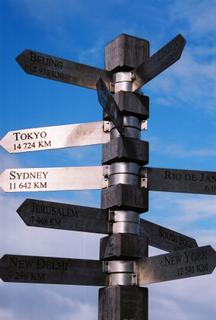Hurricane Katrina finally forced the media to acknowledge something we've washed over for years. Poverty is one of the greatest ills of the United States, and yet we have managed to downplay it as often as we can.
Unfortunately, it took a tragedy for us to stop and consider the destructive nature of poverty. For us to be silent and ignore what we've learned would just add layers to the devastation that Katrina caused.
Soon the media will stop showing images. People will stop having a platform for telling their stories. We will move on to the next worst, greatest, horrific event to hit the country because that's what we do in the USA--we look for the next great story.
So the church must keep the stories at the forefront of our missions and ministries. We must remember Barbara in New Orleans, who never got to leave because she had no money, no car and no television warning her to evacuate before the storm. We must remember Ingrid, 8.5 months pregnant and staying in a Mississippi shelter with her father, husband and six-year-old son along with 4,000 strangers without a place to go and no money to get anywhere. We must remember faces we will never see, names we will never know and bodies we may never find--all victims of poverty and its terrorizing blow following Aug. 29's hurricane.
We must remember, pray and then speak boldly against the systems of injustice that have allowed us to overlook poverty for far too long. We must speak wisely and faithfully so that no person can turn deaf ears to the situation in the United States again. And we must continue speaking even when the ill has been cured on our own soil.

Poverty is a killer in many parts of the world. When I was in South Africa, I cleaned the feet of a man bedridden by a disease called poverty, which has manifested itself in the form of HIV/AIDS. In Jamaica, people sell their bodies because of a disease called poverty, which reveals itself in prostitution. In Paris, people are killed because of a disease called poverty, which unveils itself through crime. We must speak against systems of injustice all over the world.
We have now witnessed the effects of poverty in a dramatic way through the aftermath of Hurricane Katrina. The church cannot afford to be silent.
3 comments:
the church, we, cannot afford to allow them the poor to remain nameless.
ps: i don't get the picture..
Right . . . the photograph is a shot of a pole in South Africa with the distance to several different countries. It comes across clearer in print than online. But just using it to symbolize many areas of the world . . .
:)
I heard a man from South Africa speak about how church people addressed the government to ask for systems of justice to be in place to reduce the violence in their country. After many conversations, the government came up with plans. But violence did not go down.
The church leaders went back to the government complaining. This time the government said, "Our job is to change laws. We have done that. Your job is to change hearts. What are you doing?"
Too often the church in the U.S. (and obviously in other parts of the world, as wel) does shirk the responsibility onto the government. We're fighting for laws and programs instead of really impacting the lives of our congregations and the unchurched world around us. We let welfare do its job and hope people survive.
Unfortunately, I know too many church people that fight against these programs. Not only are they not doing the job as the church, but they are also saying, "People need to work for their success instead of relying on social programs. The government has no right spending our tax money trying to help these people who aren't helping themselves."
The truth is that church and society are going to have to both work. When we both ask each other "What are you doing?" we get a lot farther. The government must uphold the laws and some of the programs that are in place for justice. The church can help by facilitating systemic changes in how our nation runs.
We need change in our churches, as well. We must change our view of what it means to be disciples. We are disciples doing God's work in the world, getting our hands and feet dirty. But we, all too often, come out as pristine Christians. Why not get a little dirty and a little radical to really eradicate this sin of poverty?
Post a Comment